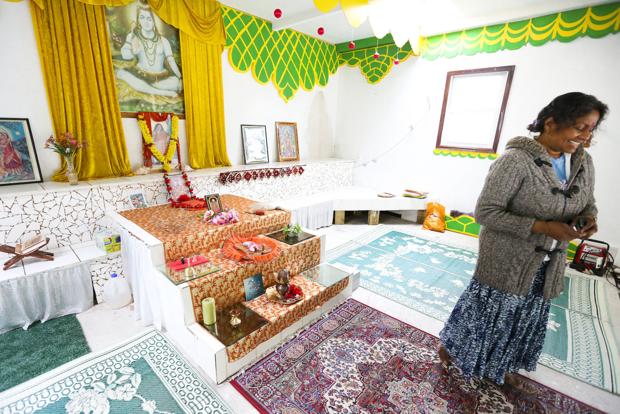EAGAN, Minn. (AP) — The gods are sporting new clothes.
Krishna’s wrapped in turquoise-colored silk. And Ganesh, the supreme deity with the elephant head, wears a garland of flowers.
Like these marble icons, Satya Balroop is dressed up, too, in a bright yellow sari. She leads temple-goers in the first of many chants during a recent celebration to mark Minnesota Hindu Milan Mandir’s first year in its permanent home.
The mandir, or temple, is a branch of India’s religious, philanthropic, charitable organization Bharat Sevashram Sangha. Balroop downplays her role in building the Minnesota temple. But it wouldn’t exist without her.
In 1998, Balroop and her husband were living in New York City, debating whether Manhattan was the best place to raise their young sons. As devout Hindus, they consulted their guru about moving to Minnesota, where they had relatives.
“He said, ‘Yes, absolutely. Minnesota is God’s land. Go there,’” Balroop recalled. “And that’s when he added an extra line: ‘You must start a temple there,’” she recalled, laughing.
For Balroop, a native of Guyana, it was more blessing than demand, a sign of the guru’s faith in her. Within months, she and her family were living in Eagan and holding religious services on the first floor of their home, just around the corner from the flat-screen television.
The next step was to transform the detached garage into a temporary temple, a place to worship until they could afford something larger. “The sheetrock and the insulation and all of that, we did it with our little kids,” Balroop said.
“At first, some people didn’t believe me,” said son David, now 25. “You would just tell them, ‘We’re building a temple.’ And they’d be like, ‘What? A temple in your backyard? Yeah, right.’”
Others in the Hindu community were slow to help with the garage temple, but Balroop was undeterred. She quickly turned her attention to the acquisition of deities, statue-like representations of Hindu gods that grace the altars of most temples.
With financial help from family and friends in New York, the temple bought 12 deities, including Goddess Durga, considered mother of the universe, and Hanuman, the monkey god.
But while being transported to Minnesota, the gods got in a wreck.
“I got a phone call in the middle of the night from my brother, who was driving the deities back in a U-Haul. And he said, ‘A big deer jumped in front of us.’ The deer was dead on the spot and their vehicle was totaled,” Balroop said.
Surprisingly, a thorough inspection revealed damage to only one Hindu icon.
“Lord Rama, his bow and arrow were broken. Lord Rama always carries a bow and arrow. That was the only thing broken. And the deer was dead,” Balroop said with a smile. “I mean, what do you make of that?”
With the deities safely in place on the makeshift altar, Balroop launched weekly services, sometimes cramming 60 people into the converted carport. Her husband prepared free, after-worship fare, from curry pasta to West Indian-style chow mein. Students practiced traditional dance in the Balroop’s basement. Yoga was held on the lawn.
She got some pushback from her family members. “‘Oh, you’re here to ruin my life?’ I did hear lines like that,” Balroop admitted.
But the family’s united effort paid off. Eventually, word of the tiny Minnesota temple made its way to high-level Hindu leaders. Balroop began hosting swamis from around the world, including the late Swami Akshayananda Maharaj, the president of Bharat Sevashram Sangha.
“He’s like the pope for us,” Balroop explained.
“When he came, we didn’t know what to do. We’d never been around someone of such high divinity,” said Tara Jeffrey, Balroop’s sister. “It was in the heart of winter, snowing like crazy. When he arrived here, we rolled the red carpet all the way in the snow and everything.”
Balroop had the honor of washing the holy man’s feet, although she needed a bit of coaching.
“I started with his left foot and he says, ‘No, no, no. Right (foot), always (right foot first).’ I apologized,” laughed Balroop.
These days, the accommodations are much improved. Balroop, her family and friends pooled their savings — $165,000 — to purchase a former Lutheran church in Farmington that sat empty for years.
A two-story Christian cross is permanently embedded in the brick facade. “It doesn’t bother anyone, really,” said Balroop. “I mean, it’s still God.”
Chanting fills the 18,000-square-foot temple the devotees now call home. Among the worshippers and visiting Hindu leaders who gathered for a celebratory service on a late Saturday afternoon was Swami Purnatmananda Maharaj, who originally charged the Balroops with establishing a temple.
“Good hearts. Good souls. Dedicated,” he said, describing Balroop and her family. “What they are doing, it is not for themselves. It is for society, for mankind, for future generations. They are doing their best. God bless them. They will be happy. God will help them.”
On average, 40 families now attend weekly services. Balroop’s current focus is on upping that number.
While she’s proud of the new building, the original temple still holds a place in her heart.
She’s never taken down the temple she and her family built in their garage. Back at home, she shows off the candles and shells that take the place of motor oil and hedge trimmers. A three-tier altar rests under the white, stucco ceiling.
“This space will always be here,” she said, “for those who like a private moment during the day to come and meditate or get away from the rat race … to just come and do their prayer.”






